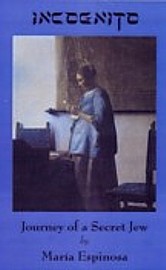Wings Press, San Antonio, Texas, 2002, 189 pages
This is a story about Marranos (also known as anusim,forced ones), secret Jews of Spain who passed as Christians. The story takes place in the late 15th and early 16thcenturies. The term Marrano is highly pejorative. It literally means swine. However, it has been widely used by those of both faiths to designate undercover Jews, regardless of whether conversion was voluntary or at sword’s point.
Alfonso, a native of Cadiz, learns at the age of thirteen that certain members of his family have remained secretly faithful to their Jewish roots. As a young child, he had watched the Jews leave Spain when they were expelled in 1492. Endowed with a mystical nature, the revelation of his family’s Judaizing comes as a shock. He struggles to reconcile his conflicts through study of the Kabbala, which serves for him as a bridge between the two religions.
Several years later Alfonso falls in love with Emilia, whom his household has sheltered since her infancy. Because his father opposes their marriage, Emilia is whisked off to a convent. Alfonso goes to sea. When he returns, he finds that Inquisitors have arrested his parents. He, too, is seized and tortured. With the help of a Marrano priest, he escapes, rescues Emilia from the convent, and marries her. They flee to Lisbon, which has become a place of refuge. However, 1506, drought, famine, and plague contribute to a wave of violence against the Jews in which Emilia and their children perish. Grief drives Alfonso into a world of madness. After many months, he recovers sufficiently to travel to Amsterdam where he undergoes circumcision. A Northern European Jew, Rachel, nurses him after the surgery and becomes his second wife. They sail to Brazil, where they join a colony of Marranos.
The core issue is that of identity, and the story deals with the effects of concealing one’s identity in order to survive.
The author reconstructs the Spain of that time very vividly. There are many memorable characters, including a sympathetic picture of the King of Spain’s mad sister.
The modern reader can begin to understand the situation be a comparison with the narratives of underground Judaism in Soviet Russia. I enjoyed the novel, which does indeed ask that recurring question: who is a Jew?
CHAIM SEYMOUR, The Association of Jewish Libraries Newsletter
Espinosa, like a skilled detective, gathers the fragmentary narratives of theconversos, who, after all, were disinclined to leave any written records for fear of the Inquisition. . .
Incognito succeeds not only in telling of the hidden history of the conversos, but of the journey for dignity, self-determination, and honor. Espinosa’s portrayal, moreover, is a metaphor for our contemporary world where multiple identities and competing loyalties haunt many individuals.
ROSA MARTHA VILLARREAL, Tertulia Magazine
. . . A richly textured story in which Alfonso and his family struggle to retain their values and traditions in the face of relentless and bloody persecution. . . . It is a family in which every aspect of life is determined by the secret of their identity and by Spain’s then-fanatical obsession with cleansing itself of all non-Christian peoples. . . Incognito throws new, bright light on a very dark period in Spanish history.
ED CONROY, San Antonio Express-News
From Incognito: Journey of a Secret Jew:
The walls of this room were pale gray. The narrow windows had thick dark panes, and candelabra on the walls blazed with tiny flames. No images of Madonnas or saints, no fragrance of burning incense leavened the bareness. The men around him, as well as those women he had seen on their way to the balcony, were dressed in severe dark clothing, save for the men’s snowy white prayer shawls with their blue embroidery.
The rabbi opened the curtains behind him and took out a Torah scroll. He placed it reverently upon a pulpit, unrolled it, and read from it. A cantor sang a melody, and then the rabbi began to address the congregation in Flemish.
Alfonso could barely understand the words, but the rabbis intensity, and the swaying and moaning of men around him as they chanted in response to the Hebrew prayers, affected him strongly. The sea of all their voices rose above Alfonso’s chest and throat until he felt as if he were choking. He leaned his thighs back against the wooden bench and gripped the floor with his feet in order not to fall.
His father, so restrained and courageous in the face of danger, choked back a sob. As Alfonso turned to look at him, he glimpsed the ghost of the old Jew who had tried to abduct him long ago from the wharfs of Cadiz when he was barely seven. The old Jew’s white hair and beard floated like a halo around him. He hovered over Don Carlos, who sank to his knees. Rafael and Alfonso tried to pull their father to his feet, but he resisted their efforts.
Let him be, said the old Jew in clear tones. He has hidden his sorrows, and he needs to mourn.
Alfonso recalled the Jews clambering onto ships, weeping over their departure from Spain and over the deaths of loved ones. He remembered ragged Jewish children, their faces swollen with hunger.
. . . The ghost hovered over them all, then mischievously blew into Alfonso’s ear. The ends of his prayer shawl became wings, and he flapped upwards, as he had in Alfonso’s childhood dream. He watched the congregation from a spot near the ceiling. But only Alfonso seemed aware of his presence, and he wondered if the Devil were playing tricks on him
